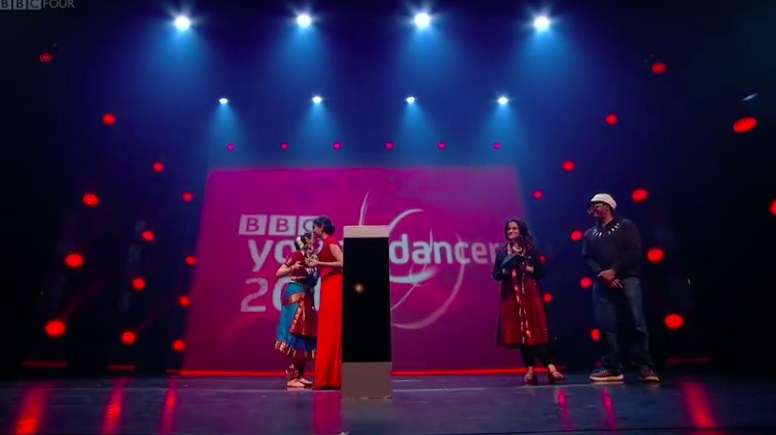Friday 19 April 2019
It’s eight o’clock and I’m in front of the TV with a dosa dinner to catch the first of the BBC Young Dancer category finals – South Asian.
The hour passes incredibly quickly and I get the impression that the contest in this third edition has reached a new high point.
Why is this round different? For one, the technical standards of all five dancers is uniformly high. Secondly, there is an ease and confidence in the performers which allows their personalities to shine through.
Each contestant has to perform three dances: a technical piece, a newly-created solo and a duet. The requirement of new compositions has unleashed a creativity in the sector never seen before.
There is something to be admired in each of the five contestants.
Aishani Ghosh injects great physical strength and control in her technical piece Prodosha. The speed and clarity of her jattis and the chiselled held postures are stunning. Her duet with her contemporary dance colleague gives full scope to the demands of contact, floor work and lift, all well executed. The abhinaya solo makes less impact.
Mahika Gautam maintains an engaging and warm performance quality throughout. Her technical piece is a tarana which is followed by two expressive studies. Her movements have a liquid grace and her abhinaya is convincing both in the duet, which exudes pain and sorrow, and in the light-hearted quality of the solo where she plays with a bird. Her expressions are both individual and naturalistic.
Sundaresan Ramesh makes great use of his lithe and light frame to leap high and cover space in his technical piece. His duet with bharatanatyam dancer is nritta-based, with a jazzy up tempo beat. Finally, the abhinaya drawn from the Ramayana with three characters of Ram, Hanuman and Sita does not allow sufficient drama to give full reign to his expressive potential – it is muted.
Tulani Kayani- Skeef opens with a sparkling technical piece: her chakkars, footwork and use of torso with movements of arms and head make her a standout dancer. The abhinaya, a romantic ghazal, is sweet, though the duet of a pair of dancing bronzes escaping does not go beyond set movements in the choreography. Despite that, Tulani is a dancer to watch out for.
The last contestant, Shree Savani, has a surprise up her sleeve. Her technical piece is adequate; but where she comes into her own is in the skilfully crafted duet of a mother-daughter relationship (concept and choreography much her own with creative input from Dimple Chauhan and teacher Bhagya Lakshmi). Shreya Vadnerkar joins her as the mother and the synergy between the two is utterly compelling. The dancing here, which incorporates leaps and high kicks (the duo’s Bollywood training gives an unusual flamboyance) is exciting to watch. The last frame of the dancer, her face full of love and sorrow as she comprehends her mother’s vulnerability, seals the performance. Shree’s mastery of expression is further evidenced by her enactment of the most infamous episode of the Mahabharata, that of ‘vastra-haran’ the de-robing of Draupadi in the court of the Pandavas. Each character is well delineated, especially the smirking Dushahana.
As the judges gather to announce the winner, the field feels open and we could have any of the five. Then we have the result, and it is clear that on this occasion it was the abhinaya that won the day. Jonzi D, the hip-hop pioneer who is the Chief Adjudicator, homes in on Shree Savani’s story-telling prowess. There is no doubt that Shree’s spontaneity, charm and emotional depth have elevated her to the status of Category Finalist. Leicester-based Nupur Arts, directed by Smita Vardnerkar, where Shree trained, share the triumph with the winner.
The issue that occurs to this writer is how far the choreography of the dances contributes to the impression made on the judges. This is an open question for all involved.
In conclusion, standards are rising and BBC Young Dancer is injecting oxygen into the South Asian dance sector, giving opportunities not only to the students but teachers, mentors music composers and dress designers.
As a sector, we are indebted to the teachers of the finalists: Sujata Banerjee (Mahika Gautam and Tulani Kayani-Skeef); Chitralekha Bolar (Aishani Ghosh); Pushkala Gopal (Sundaresan Ramesh); to the mentors Urja Desai Thakore and Geetha Sridhar; judges Seeta Patel, Gauri Sharma Tripathi and Jonzi D; Yuva-Gati (4 of 5 contestants had some training under the scheme) and to the creators of BBC Young Dancer.




